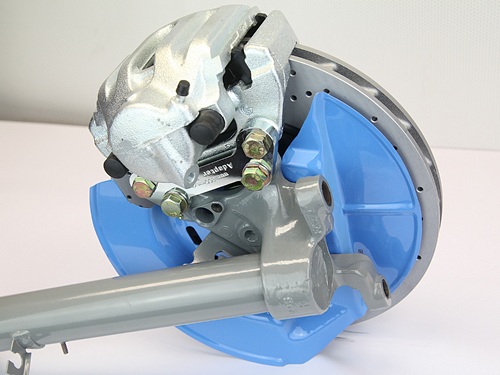
The new bushings include an inner o-ring that helps trap grease on the slide bolt, reducing friction and wear. High temp caliper grease or anti-seize is required. Installation is straightforward: remove the old rubber bushings and press in the new brass bushings (we recommend special tool 003326ECS03). Unlike other kits, these bushings are pressed into the caliper and will not shift or slide on their own. This is the most complete kit we have ever sold with stainless steel caliper slide bolts, o-rings, and new dust boots. This will give you much longer pad life and a more consistent pedal feel. These solid brass bushings will not twist or deflect so your calipers can squeeze the pads evenly on both sides of the rotor (sort of like what multi-piston big brakes do). The rubber bushings allow the caliper to deflect and twist which affects pedal feel and results in uneven pad wear. As the brake pedal is pressed the caliper grabs the rotor and twists on its mounting bushings. This caliper bushing kit will eliminate flex caused by weak rubber caliper bushings. Rebuilt calipers are sold on a core exchange basis so we need your original calipers returned to us. Replacing the calipers with newly rebuilt units does not take any more signifcant time during a typical brake pad/rotor overhaul. The caliper you get is ready for a direct replacement on your car! There's no mess from brake fluid leaking everywhere and no fighting to get the piston seals to fit. The pistons are rebuilt with new seals and dust boots and re-installed into the caliper housing. Each caliper is cleaned and sand-blasted to remove surface rust and dirt/grime. As a convenience we offer freshly rebuilt calipers. Unfortunately you really don't know for sure until you have removed the caliper and taken it apart. We offer brake caliper rebuild kits but sometimes the condition of the inner piston is just not safe to re-use. A rusted caliper will cause the piston to seize, creating a stuck caliper, dragging brakes, wheel vibrations, pulling to one side, excessive brake dust and heat, or even a total loss of brake function on that wheel. Not replacing your brake fluid regularly will lead to water entering or forming in the system and that will rust the calipers and hard brake lines from the inside out.

The caliper and the internal piston are made from cast iron and is prone to rust just like any other ferrous material. The number one problem with brake calipers is caused by rust. Brake calipers require periodic maintenance just like the rest of your braking system.


 0 kommentar(er)
0 kommentar(er)
